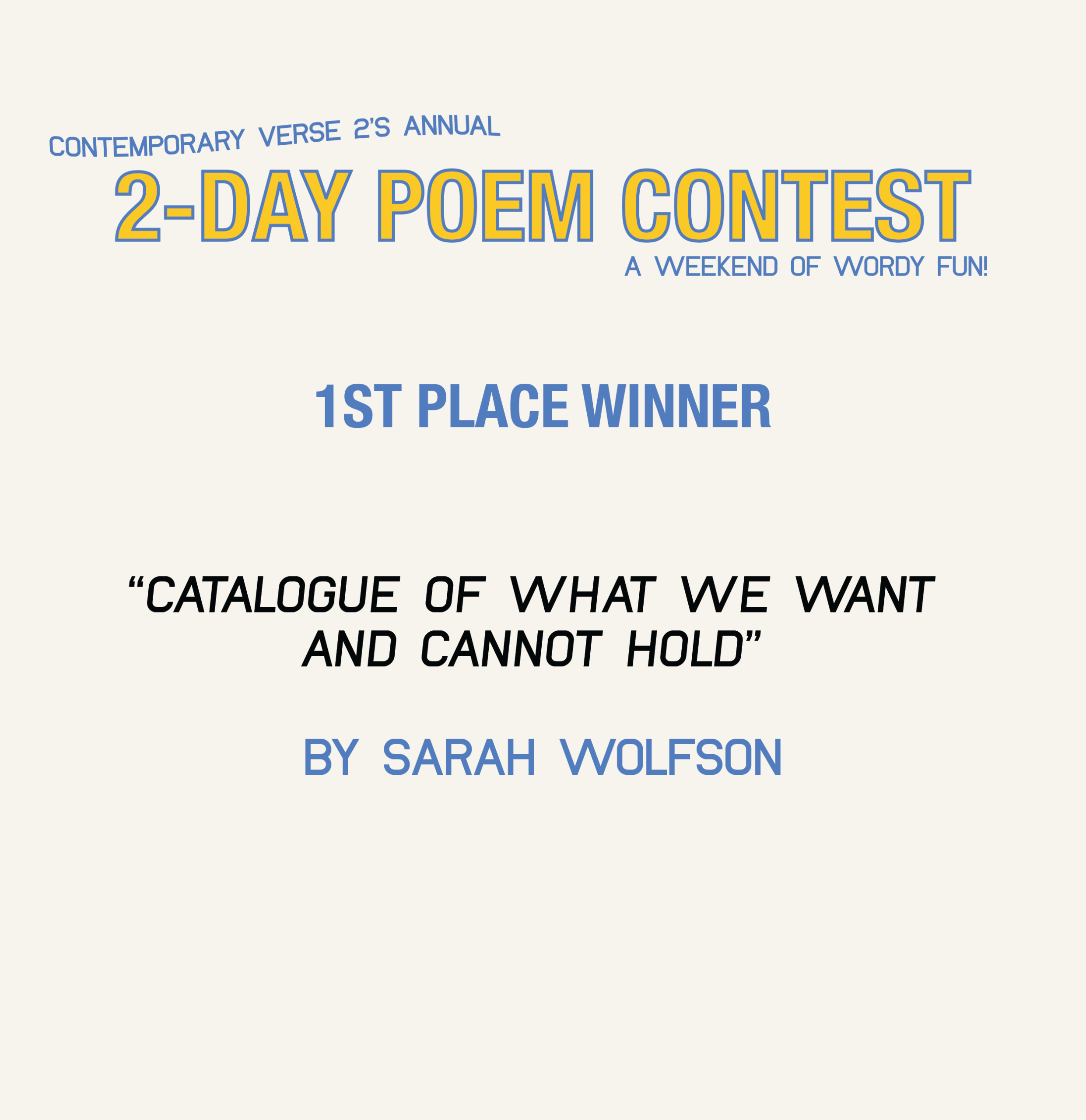
We’re thrilled to announce the winners of this year’s CV2 2-Day Poem Contest, as selected by our judge (and last year’s winner) Hollie Adams; our poetry editors; our managing editor’s mom; and you!
These poets crafted some stunning poems over the course of 48 hours, using a dastardly ten-word list, and you’ll get to read all of them in our Fall 2025 issue!
Read on to hear what judge Hollie Adams had to say about the first, second, and third place winners, and be sure to join us next spring for the 2026 2-Day Poem Contest!
First Place: “Catalogue of What We Want and Cannot Hold” by Sarah Wolfson
Second Place: “At the Stroke of Midnight” by Kerry Rawlinson
Third Place: “Group Chat Finds Love” by Sarah Ens
Editor’s Choice: “Winnipeg, July 2024” by Jackie Sommers
Editor’s Mom’s Choice: “In a Past Life We Were Queer Women Convalescing at the Seaside” by Dessa Bayrock
People’s Choice: “Starving and Moon-Soaked” by Chelsea Comeau
“Catalogue of What We Want and Cannot Hold”
This poem mesmerizes and surprises, full of fresh phrasing and arresting images: “a sudden tangerine ether,” “the muck of planets,” “stiff lexical cabinet.” It challenges the reader in its fragmentation, its fifteen seemingly disjointed numbered stanzas. Yet the impression it leaves is one of coherence—in its mood (meditative, somber), its recurring themes (what has been lost, what is being grieved, what has been found, how we persevere), and its motifs (celestial bodies, animals, and food imagery abounds). It is planetary in scope, yet the focus of this poem remains the local, the domestic, the quotidian—though not in a way that bores but in a way that elevates the mundane to the status of art object. The poem repeatedly zooms out to capture the world at large, then zooms in, turning its attention on a specific neighbourhood in Montréal, a specific dog, a specific speaker standing “again aslant.” It is playful yet serious, employing juxtaposition to stunning effect: “Take as much time as you need/ with your rotisserie chicken, your wild pain.” The ten required words are deployed so masterfully, woven into such a rich tapestry of language, that I didn’t bat an eye—not even at “hypocorism.” When I arrived at the last word, I immediately wanted to—and did—read this poem again. And again. And again.
“At the Stroke of Midnight”
A mix of the fantastic and the real, this is a complex, finely-crafted poem, in which the form and the subject matter deeply inform one another. A meditation about the possibility of starting over and rewinding time, this poem loops back on itself, the second half of the poem becoming a distorted mirror-image of the first. Phrases and images that appear in the opening stanzas are creatively reconceived later in the poem. In the first two stanzas, for instance, we read that “time loops, rotting” as “pumpkins pray to/ become wild rides with no curfew.” In the last two stanzas, the poem asks whether with “no curfew, could we rewind/ cells, bodies, worlds, timeloops, rotting pumpkins?” At the turning point of this poem, we are told to “start over,” and from there, the poem hinges on its axis and starts over, familiar yet changed. Like the exhausted parents in this poem who are falling apart, there is a sense that this poem itself is falling apart, with extra space following every instance of caesura. The ten required words are inventively incorporated: babies wail “tangled in tangerine vines,” the feral cat becomes a “milquetoast girl,” aspens “agglomerate” and newborns are “moon-bruised.” Even more impressive is that the poem uses each word twice.
“Group Chat Finds Love”
This poem is fun! It impresses me with its concision, its ability to include the ten required words in natural yet creative ways in such a short space. The poem draws the reader in through the
narrative that unfolds as well as through the pleasurable rhythm it creates through alliteration (“mediocre, milquetoast,/ many, many maybes”) and assonance (“zip & fizz,” “tangerine steam,” “between vaping teens”). I appreciate that this poem doesn’t shy away from the popular culture of the present-day, knows that dating apps and Sex and the City and throuples can be the subject matter of good poetry. This poem not only delights and entertains—it also speaks to something relatable, real, and profound: women unsure what they want or where to find it, scared but trying, with nothing to do but reach for what they already have, practiced as they are at imagining more for themselves, decide to pretend something as mundane as a porch light is something as extraordinary as the moon.
